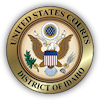 SUNDAY, NOVEMBER 17, 2024
SUNDAY, NOVEMBER 17, 2024 
 SUNDAY, NOVEMBER 17, 2024
SUNDAY, NOVEMBER 17, 2024 Possession of a weapon after termination of supervision: Prohibition of possession of a firearm or other destructive devices by a felon is not limited to the period of time you are under supervision, but is for a lifetime, unless you receive approval from the proper authorities. After you have been discharged from supervision, the Federal Gun Control Act of 1968 prohibits you from owning or possessing a firearm. Currently, with respect to a federal felony conviction, the only way to receive relief is to get a presidential pardon. To determine whether you are eligible to apply for a presidential pardon, contact the pardon attorney at the following address:
The Office of Pardon Attorney
U.S. Department of Justice
1425 New York Avenue, N.W.
Suite 11000
Washington, D.C. 20530
www.justice.gov/pardon
Include in your letter the date and place of your conviction, the nature of the offense, the sentence you received, when released from prison and/or when released from supervision. A pardon does not erase or expunge the record of conviction. It is, however, an indication of forgiveness and should lessen the stigma of conviction. It is usually helpful in obtaining a license, bonding or employment. Many states also have laws that govern the possession of firearms by convicted felons. Those provisions are separate from federal requirements. Your federal felony conviction prohibition is for a lifetime, regardless of the state law. This can become a complicated issue, and we recommend that you never possess a firearm unless you are completely sure your right to possess a firearm has been restored